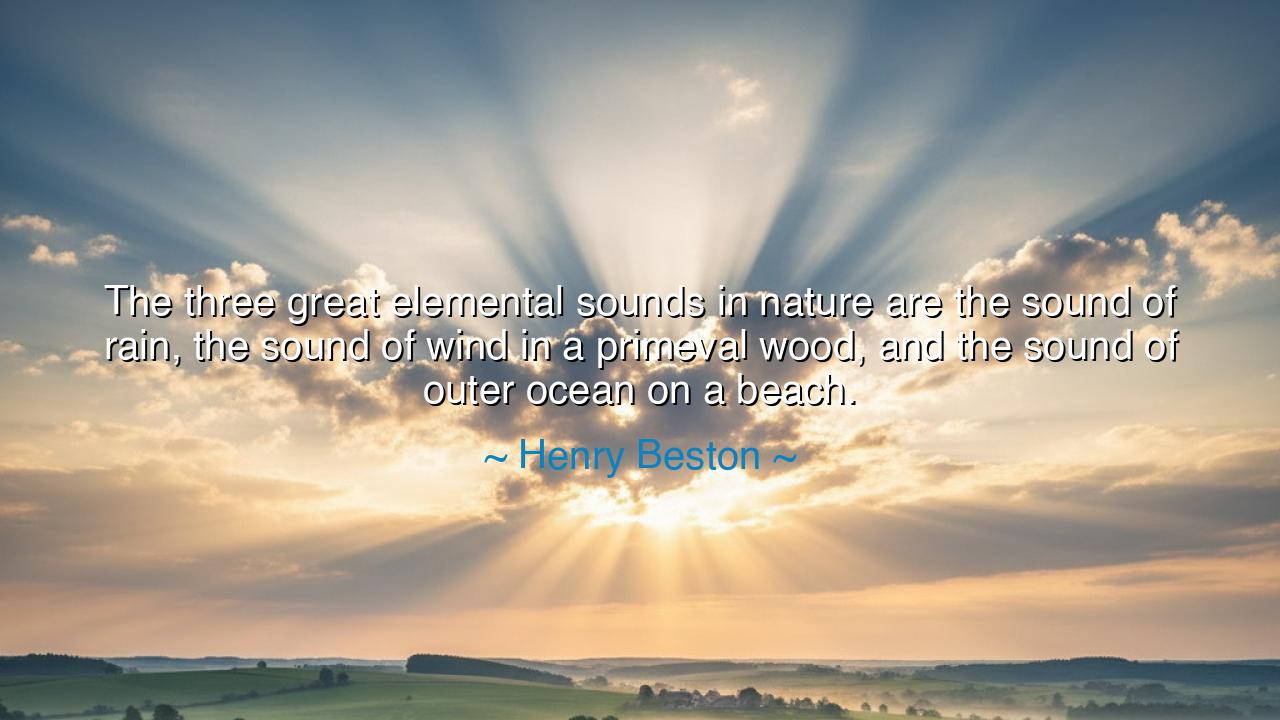
The three great elemental sounds in nature are the sound of rain
The three great elemental sounds in nature are the sound of rain, the sound of wind in a primeval wood, and the sound of outer ocean on a beach.






Hearken, O seekers of wisdom, to the meditative words of Henry Beston, who observed: “The three great elemental sounds in nature are the sound of rain, the sound of wind in a primeval wood, and the sound of outer ocean on a beach.” In these words lies a profound reflection upon the rhythm, power, and eternal presence of nature. Beston reminds us that the world speaks not only through sight and form, but through sound — the subtle yet mighty music of life itself, which conveys both serenity and the raw grandeur of existence.
From the earliest civilizations, sages and poets recognized the elemental forces of nature as teachers and companions. In the forests of ancient Europe, Druids attuned themselves to the murmur of leaves, the patter of rain, and the crash of waves, discerning in these sounds the order and mystery of the cosmos. Beston’s observation mirrors this timeless insight: the music of nature nourishes the soul, awakens awareness, and connects the observer to a reality far beyond human constructs.
The words illuminate the power of elemental sound to evoke reflection and awe. Rain, falling upon earth, speaks of renewal, sustenance, and quiet persistence. The wind in an untouched forest carries whispers of time, resilience, and the interconnectedness of all living things. The ocean’s roar upon the shore speaks of vastness, eternity, and the ceaseless cycles of life. Each sound, simple yet profound, conveys the immensity and intimacy of the natural world, reminding us of our place within it.
Consider the life of John Muir, who wandered the forests and mountains of North America, listening intently to the streams, winds, and oceans. In these elemental sounds, he found both solace and inspiration, shaping his vision for conservation and the protection of wild places. Like Beston, Muir recognized that nature’s music is both a teacher and a balm, revealing truths of beauty, permanence, and humility to those who attend with care and reverence.
Beston’s reflection also speaks to the importance of presence and attentiveness. In a world of human noise, the elemental sounds of nature demand mindful listening. They are not merely heard; they are felt and contemplated. The ancient philosophers understood that by attuning to nature, the soul achieves harmony, reflection, and clarity. Rain, wind, and ocean are more than mere phenomena; they are eternal rhythms that teach patience, perspective, and reverence.
From this meditation emerges a timeless lesson: seek the elemental, the primal, and the enduring in life. Just as rain nourishes the earth, wind shapes the forest, and the ocean sculpts the shore, so too do moments of stillness, observation, and reflection shape the mind and spirit. By attuning to nature, we are reminded of life’s vastness, our responsibilities, and the beauty inherent in simplicity and continuity.
Practical counsel flows naturally: spend time in nature and listen. Attend to the patter of rain, the rustle of trees, and the rhythm of the sea. Let these elemental sounds restore perspective, calm the mind, and inspire contemplation. In doing so, one cultivates patience, wisdom, and a sense of connection to the eternal cycles of the world.
Thus, O listener, let the words of Henry Beston illuminate your path: the sounds of rain, wind, and ocean are not mere background; they are elemental teachers, carrying the wisdom of the ages. Attend to them with care, allow their music to awaken insight, and let the eternal rhythms of nature guide reflection, nourish the soul, and inspire awe in every moment of your journey.






AAdministratorAdministrator
Welcome, honored guests. Please leave a comment, we will respond soon